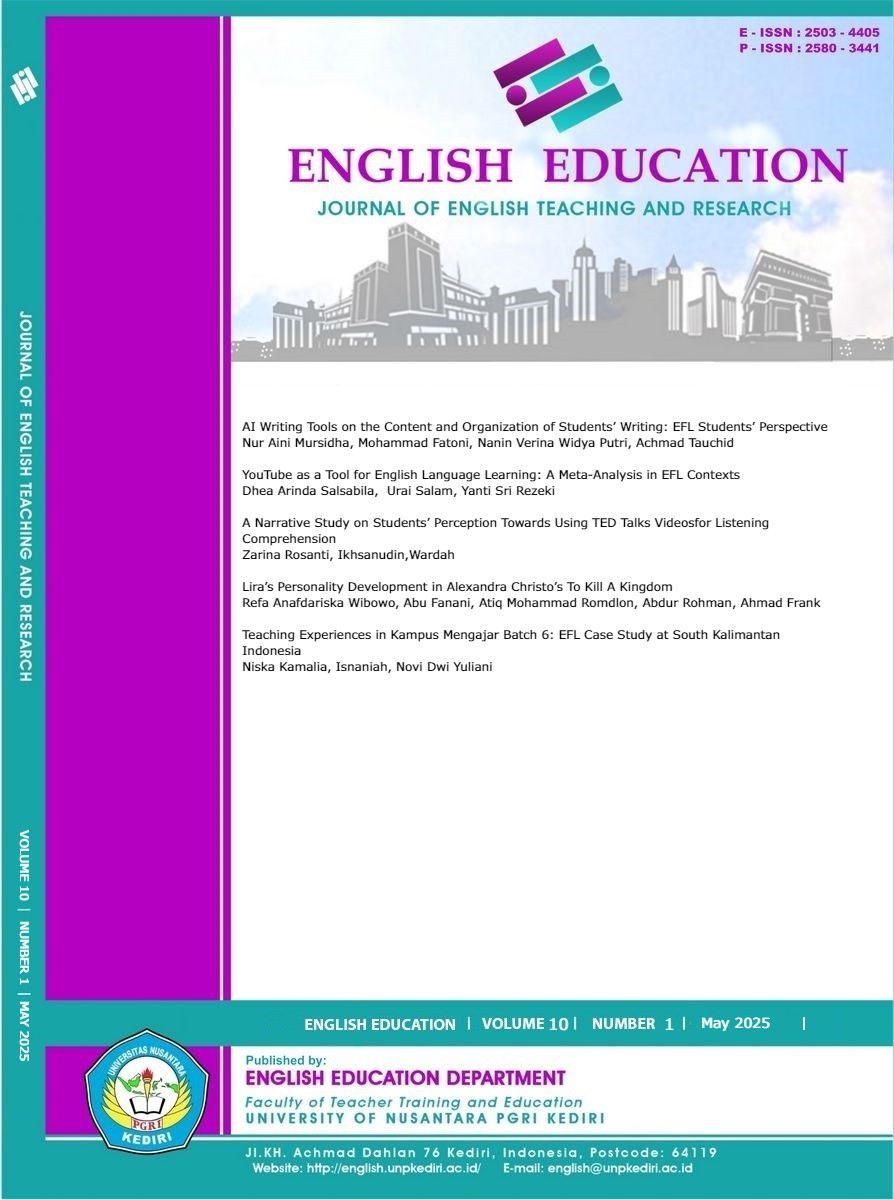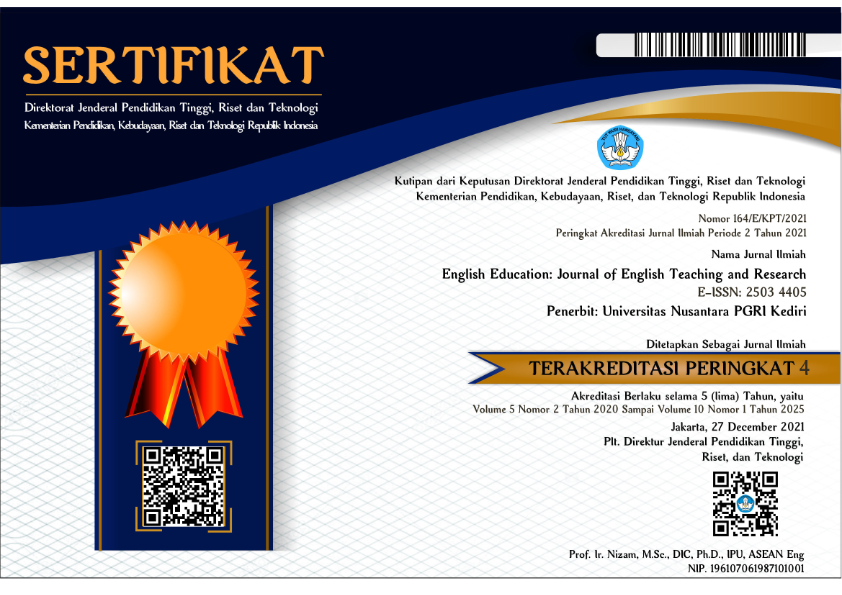Developing a Nearpod Game-Based Assessment for Grammar Mastery in Elementary Learners
DOI:
https://doi.org/10.29407/jetar.v10i1.24014Keywords:
game-based assessment, comparative degree, superlative degree, research and developmentAbstract
This study addresses the challenge of enhancing fifth-grade students' mastery of comparative and superlative degrees through a game-based assessment using the Nearpod platform. The primary research question investigates whether interactive and technology-based tools may enhance students' comprehension of these grammar concepts. The study employs a research and development (R&D) design based on a modified Borg and Gall model, involving phases such as needs analysis, development of product, validation by expert, revision, and field testing. Data were collected through classroom observations, questionnaires, expert evaluations, and a trial with thirty students. The assessment tool developed on Nearpod received strong validation scores from media and language experts and demonstrated reliable internal consistency. A total of seventy percent of the test items were found to be valid, indicating strong alignment with learning objectives, while others were revised to improve clarity and discriminatory power.The results confirm that Nearpod not only increases student motivation and enjoyment but also serves as a valid and reliable medium for assessing grammar skills. This study offers practical insights for educators seeking to integrate technology-enhanced assessments into grammar instruction at the elementary level.
Downloads
References
Abdullah, M. I., Inayati, D., & Karyawati, N. N. (2022). Nearpod use as a learning platform to improve student learning motivation in an elementary school. Journal of Education and Learning (EduLearn), 16(1), 121–129. https://doi.org/10.11591/edulearn.v16i1.20421
Azzmi.H., M. N., Yuhana, U. L., Sulistyani, N., & Husniah, L. (2023). Analyzing the Quality of Game-based Assessment Design in Basic Arithmetic Operations. Kinetik: Game Technology, Information System, Computer Network, Computing, Electronics, and Control, 4(1). https://doi.org/10.22219/kinetik.v8i1.1599
Borg, W. R., & Gall, M. D. (1983). Educational research: an introduction. New York and London: Longman.
Burmich, A., Mashkin, O., & Stepanova, N. (2023, November). The Role of Game-Based Assessment for the Enhancement of Learning. In International Conference on Professional Culture of the Specialist of the Future (pp. 356-369). Cham: Springer Nature Switzerland.
Chairunnas, A., Zen, D. S., Rahmawati, H. A., & Mirnawati, M. (2022). Development of A Web-Based Nearpod Application in Increasing Elementary School Students’ Interest in Learning. QALAMUNA: Jurnal Pendidikan, Sosial, Dan Agama, 14(1), 435–452. https://doi.org/10.37680/qalamuna.v14i1.4380
Courtney, L., & Graham, S. (2019). “It’s like having a test but in a fun way” Young learners’ perceptions of a digital game-based assessment of early language learning. Language Teaching for Young Learners, 1(2), 161–186. https://doi.org/10.1075/ltyl.18009.cou
Feri, A., & Zulherman, Z. (2021). Development of nearpod-based e module on science material “energy and its changes” to improve elementary school student learning achievement. International Journal of Education and Learning, 3(2), 165–174. https://doi.org/10.31763/ijele.v3i2.400
Jin, Z., Li, Y., Lin, C. L., & Li, C. H. (2022). Exploring the Impact of Game-based Learning on Students’ Creativity from the Perspective of Interest, Relationship and Opportunity. 30th International Conference on Computers in Education Conference, ICCE 2022 - Proceedings, 2, 494–504.
Kim, Y. J., & Shute, V. J. (2015). The interplay of game elements with psychometric qualities, learning, and enjoyment in game-based assessment. Computers and Education, 87, 340–356. https://doi.org/10.1016/j.compedu.2015.07.009
Magaba, V. (2023). English Writing Challenges of First-Year Students: A Case Study of a University in the Eastern Cape. Athens Journal of Philology, 10(1), 35–52. https://doi.org/10.30958/ajp.10-1-2
Putri, Dwi A. L., Tambusai, A., & Hasibuan, A. L. (2022). Students’ Difficulties in Acquiring English Writing. International Journal of Educational Research Excellence (IJERE), 1(1), 19–26. https://doi.org/10.55299/ijere.v1i1.21
Rivelia, K. P., & Reinita, R. (2023). The Development of Nearpod Interactive Multimedia Using Problem Based Learning Models on Civics Learning in Elementary School. Jurnal Basicedu, 7(2), 1117–1126. https://doi.org/10.31004/basicedu.v7i2.4897
Setyosari, P. (2016). Metode Penelitian Pendidikan & Pengembangan. Prenada Media. https://books.google.co.id/books?id=SnA-DwAAQBAJ
Uyen, P. T. (2023). The Perception of EFL Primary Students Toward Learning English Through Interactive Games. Proceedings of the 5th Conference on Language Teaching and Learning, 181–199. https://doi.org/10.21467/proceedings.150.21
Downloads
Published
Issue
Section
License
Copyright (c) 2025 Dita Farisa Setyo Budhi, Nur Afifi

This work is licensed under a Creative Commons Attribution-ShareAlike 4.0 International License.
Authors who publish with this journal agree to the following terms:
- Copyright on any article is retained by the author(s).
- The author grants the journal, the right of first publication with the work simultaneously licensed under a Creative Commons Attribution License that allows others to share the work with an acknowledgment of the work’s authorship and initial publication in this journal.
- Authors are able to enter into separate, additional contractual arrangements for the non-exclusive distribution of the journal’s published version of the work (e.g., post it to an institutional repository or publish it in a book), with an acknowledgment of its initial publication in this journal.
- Authors are permitted and encouraged to post their work online (e.g., in institutional repositories or on their website) prior to and during the submission process, as it can lead to productive exchanges, as well as earlier and greater citation of published work.
- The article and any associated published material is distributed under the Creative Commons Attribution-ShareAlike 4.0 International License








 Article template
Article template



